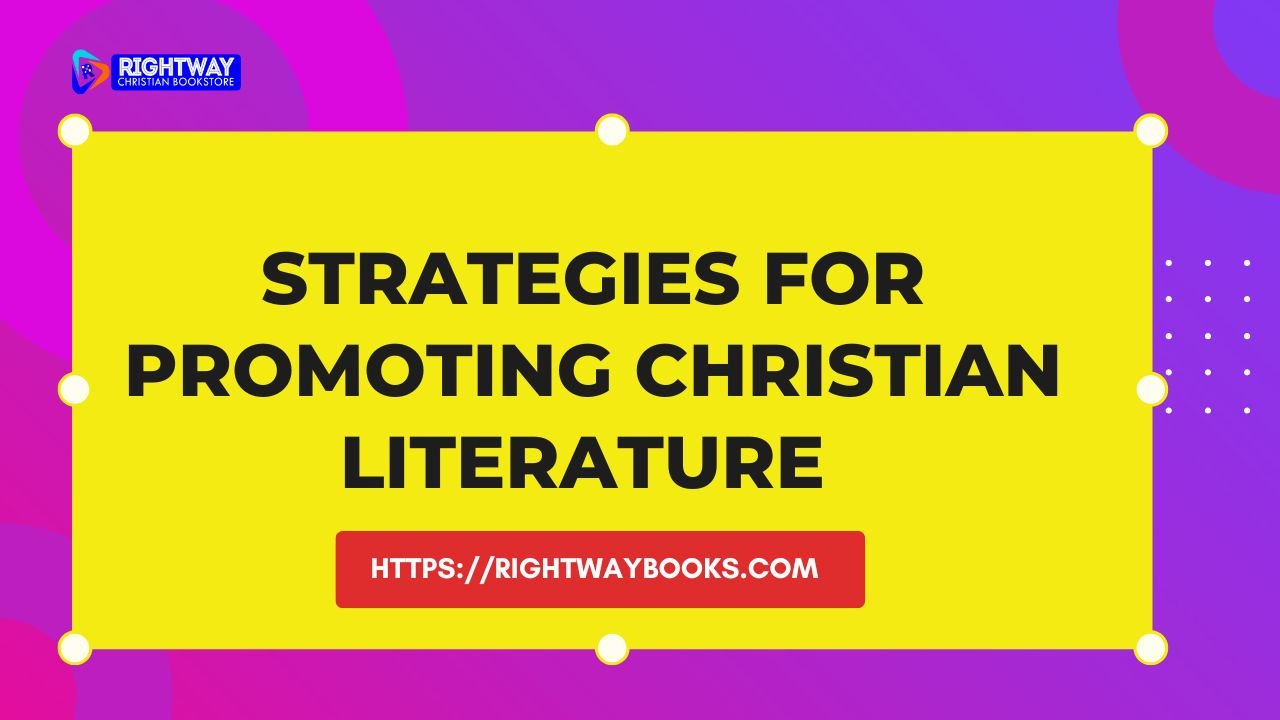DIVINE STRATEGIES FOR MARKETING CHRISTIAN LITERATURE

In a world filled with different ways of sharing information, getting Christian literature noticed requires special strategies.
Divine Strategies for Effectively Marketing Christian Literature explores creative and purposeful approaches. We aim not just to reach more people but to touch their hearts and minds. This journey goes beyond conventional marketing methodologies, focusing on ways that align with spiritual principles and understanding what readers truly need.
We are aware that the habit of reading, both within the Christian community and globally, has significantly declined. This emphasizes the need for a more profound and spiritually driven approach in creating and promoting our books. Our focus should be on making them simpler and more engaging while delivering a clear message without any ambiguity.
In this lecture, we'll look at simple and effective ways that follow Christian teachings, which authors can use to market their books and still make more money.
1. Prayerful Guidance: At the core of any divine strategy is prayer. Authors and publishers are encouraged to seek prayerful guidance in their endeavours. Asking for divine wisdom, discernment, and inspiration is fundamental. This spiritual foundation establishes a connection between the literature and the divine source of its message.
Marketing Christian books needs a lot of prayers. Especially in a society where reading habit has significantly declined. You pray more at every steps of your marketing strategies.
2. Divine Direction and Spirit-Led Content Creation: Christian authors are urged to let the Holy Spirit guide their writing process. Spirit-led content possesses a unique energy that resonates with readers on a spiritual level.
While some individuals might be inspired with divine titles and content for their books, others may simply recognize a need and decide to address it.
By aligning the writing process with divine inspiration, Christian literature becomes a vessel for conveying messages that go beyond the mere written word, which can influence the sales of the book positively.
3. Honest Representation: Presenting the content of a book accurately without exaggeration aligns with the biblical principle of honesty. Avoiding misleading marketing tactics ensures that readers can trust the information provided.
4. Fairness and Just Dealing: Proverbs 11:1 (NIV) states, "The Lord detests dishonest scales, but accurate weights find favour with him." This emphasizes the importance of honesty in transactions, which is relevant to marketing practices.
Leviticus 19:35-36 advises against using dishonest measures in commerce, promoting fairness and integrity in business interactions. This can also be related to pricing books ethically. Setting reasonable and transparent prices for books reflects fairness.
5. Integrity in Reviews and Testimonials: Encouraging genuine reviews and testimonials rather than manipulating or fabricating them reflects integrity. Proverbs 19:22 states, "What is desirable in a person is kindness, and it is better to be poor than a liar." This can be applied to maintaining honesty in showcasing reader feedback.
6. Respecting Your Readers: Treating readers with respect and considering their needs and preferences aligns with the Golden Rule in Matthew 7:12. Understanding the audience and delivering content that provides value fosters a positive relationship between authors and readers.
Other Marketing Strategies Which Are Also Important:
1. Free Promotions: Using free promotions can be a powerful marketing strategy for your book.
Limited-Time Free eBook: Offer your eBook for free on platforms like Rightway Bookstore (https://rightwaybooks.com), Amazon Kindle for a limited time. This can attract a large number of readers and generate buzz around your book.
Free Chapter or Excerpt: Provide a free chapter or excerpt on your website or through social media to give readers a taste of your book.
Announce your free promotion on your social media channels. Encourage your followers to share the news, expanding the reach of your promotion.
2. Discounted Promotions: Using discount promotions can be an effective strategy to market your books.
Limited-Time Discounts: Temporarily reduce the price of your book to create a sense of urgency and encourage immediate purchases.
Percentage Discounts: Offer a percentage discount, such as 50% off, to attract budget-conscious readers.
Announce your discounted promotion on your social media channels. Encourage your followers to share the news, expanding the reach of your promotion.
Use relevant hashtags to increase the visibility of your promotion on platforms like Twitter, Instagram and WhatsApp.
3. Strategic Book Launch: Successfully executing a book launch is a powerful method to sell and showcase your books. It is crucial to ensure that the individuals invited to the launch are familiar with you, your values, and are reliable supporters who won't let you down on the launch day.
Book launches can take place either online or as physical events.
4. Intentional Networking: Divine connections play a significant role in the marketing of Christian literature. Authors should seek intentional networking opportunities within Christian communities (like Christian Writers CWAN) and individuals.
Engaging with churches, Christian book clubs, and online platforms related to the category of your book facilitates a broader reach.
5. Utilizing Testimonies: Sharing real-life testimonies related to the impact of the Christian literature can be a powerful marketing tool. Testimonies not only validate the transformative power of the content but also serve as a testament to the divine influence behind the contents which will eventually motivate sales of the book.
6. Leveraging Social Media: In the age of digital connectivity, social media platforms serve as valuable tools for reaching a global audience. Christian authors must tap into social media networks to promote their books.
Social Media Platforms Like:
a. Facebook: You can advertise/promote your books on facebook by utilizing the power of Facebook Advert, or Facebook Advertising. This refers to the paid promotion of content on the Facebook platform to reach a targeted audience.
Christian authors can customize their Facebook Ads based on various factors, including the demographics, interests, and behaviours of the target audience. This targeted approach helps ensure that the ads reach the most relevant users who are likely to be interested in the book being promoted.
It offers a flexible and scalable advertising solution that can be tailored to suit different budgets and goals.
Here's a step-by-step guide:
i. Create a Facebook Page:
If you don't already have one, create a Facebook Page for your author brand or book.
ii. Identify Your Target Audience:
Define your target audience based on demographics, interests, and behaviours. Consider factors such as age, location, interests, and book genres.
iii. Create Compelling Visuals:
Design eye-catching images or graphics that represent your book. Include book covers, compelling quotes, or images related to the book's theme.
iv. Craft Engaging Ad Copy:
Write compelling ad copy that grabs attention, highlights the key features of your book, and includes a clear call-to-action (CTA). Encourage users to click, learn more, or buy.
v. Choose the Right Ad Format:
Facebook offers various ad formats, including image ads, carousel ads, slideshow ads, and video ads. Choose the format that best showcases your book.
vi. Set Up a Facebook Ad Campaign:
Go to Facebook Ads Manager and create a new campaign.
Choose the campaign objective based on your goal, such as driving traffic to your website or increasing book sales.
vii. Define Ad Targeting:
Use detailed targeting options to reach your desired audience. You can target based on interests, behaviours, demographics, and even target users who have shown an interest in similar books.
viii. Set Budget and Schedule:
Determine your daily or lifetime budget for the campaign.
Choose a schedule for when your ads will be displayed.
ix. Track Conversions with Facebook Pixel:
Install Facebook Pixel on your website to track user interactions and measure the effectiveness of your ads. This helps you understand how users engage with your website after clicking on the ad.
x. Create a Landing Page:
If you're directing users to a specific page, create a dedicated landing page optimized for conversions. This page should provide more information about the book and make it easy for users to make a purchase.
xi. Test and Optimize:
Run A/B tests with different ad creatives, copy, or targeting options to identify what resonates best with your audience.
Regularly monitor ad performance in Ads Manager and make adjustments to improve results.
xii. Engage with Your Audience:
Respond to comments on your ads, engage with your audience, and build a community around your book.
By following these steps, you can leverage the power of Facebook Advertising to effectively promote your book, connect with potential readers, and drive book sales.
b. Instagram
c. Youtube
d. WhatsApp
e. Twitter
f. etc
7. Partnering with Faith-Based Organizations: Collaborating with faith-based organizations enhances the reach of Christian literature. Establishing partnerships with churches, ministries, and Christian events provides opportunities for broader exposure and a deeper impact.
8. Blogging: Blogging is a powerful and cost-effective tool for marketing Christian books.
You can start by setting up a blog dedicated to your books. Use platforms like WordPress or Blogger.
Write blog posts that revolve around the themes, messages, or inspirations from your books.
9. Email Marketing: Email marketing is a digital marketing strategy that involves sending targeted emails to a group of individuals with the goal of promoting products, services, or building relationships with customers. It is a direct and personalized form of communication that businesses and organizations use to connect with their audience. Email marketing campaigns can include various types of content, such as promotional offers, newsletters, product announcements, and more.
10.Pray and pray until the project is completed. Don’t stop praying, prayer will make it possible and dissolve all the obstacles.
Conclusion
In concluding this lecture on Divine Strategies for Marketing Christian Literatures, let's remember the power of prayer and purpose-driven marketing in a world where reading habits are on the decline.
By incorporating these strategies, authors and publishers can engage in book marketing that not only promotes their work but also upholds ethical standards.
Pastor John Otun
07064503055




